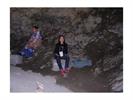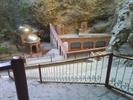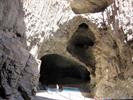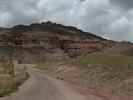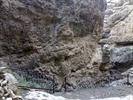Nakhichevan is famous for its places of religious worship. The most important from them is Ashabi-Kahf sanctuary, which was mentioned in “Al-Kahf” surah of the holy Qur’an. There are all facilities available for pilgrims’ visiting the “Ashabi-Kahf Worship” religious-cultural monument complex. Each year ten thousands of people make a pilgrimage to this place.
Ashabi-Kahf is situated in the eastern part of Nakhchivan city nearby the former Hachaparag village. The entrance to the caves starts from the north and stretches towards the inside of the mountain.
The Seven Sleepers (Arabic: ab al kahf, "companions of the cave") of Ephesus is a story of a group of youths who hid inside a cave outside the city of Ephesus around 250 AD, to escape a persecution. The king forced all his kingdom to worship idols and whoever did not would be killed. These men escaped as their faith in God (their belief varies by regional origin) was strong and refused to worship idols. The story is one of the many examples of the legend about a man who falls asleep and years after wakes up to find the world changed.
Another version is that Decius ordered them imprisoned in a closed cave to die there as punishment for being Christians. Having fallen asleep inside the cave, they purportedly awoke approximately 180 years later during the reign of Theodosius II, following which they were reportedly seen by the people of the now-Christian city before dying.
The earliest version of this story comes from the Syrian bishop Jacob of Sarug (c. 450–521), which is itself derived from an earlier Greek source, now lost. An outline of this tale appears in Gregory of Tours (b. 538, d. 594), and in Paul the Deacon's (b. 720, d. 799) History of the Lombards. The best-known Western version of the story appears in Jacobus de Voragine's Golden Legend.
The Roman Martyrology mentions the Seven Sleepers of Ephesus under the date of 27 July Template:June according to Vatican II calendar, as follows: "Commemoration of the seven Holy Sleepers of Ephesus, who, it is recounted, after undergoing martyrdom, rest in peace, awaiting the day of resurrection." The Byzantine Calendar commemorates them with feasts on 4 August and 22 October.
The story has its highest prominence, however, in the Muslim world; it is told in the Qur'an (Surah 18, verse 9–26). The Quranic rendering of this story does not state exactly the number of sleepers Surah 18, verse 22. It also gives the number of years that they slept as 300 solar years (equivalent to 309 lunar years). Unlike the Christian story, the Islamic version includes mention of a dog who accompanied the youths into the cave, and was also asleep, but when people passed by the cave it looked as if the dog was just keeping watch at the entrance, making them afraid of seeing what is in the cave once they saw the dog. In Islam, these youths are referred to as "The People of the Cave".
According to Muslim scholars, God revealed these verses because the people of Mecca challenged Muhammad with questions that were passed on to them from the Jews of Medina in an effort to test his authenticity. They asked him about young men who disappeared in the past, about a man who traveled the earth from east to west, Zulqurnain, and about the soul. The story parallels the Christian version, recounting the story of a group of young believers who resisted the pressure from their people to worship others beside God, and took refuge in a cave, following which they fell asleep for a long time. When they woke up they thought that they had slept for only a day or so, and they sent one of them back to the city to buy food. His use of old silver coins revealed the presence of these youths to the town. Soon after their discovery, the People of the Cave (as the Qur'an calls them) died and the people of their town built a place of worship at the site of their burial (the cave). The Qur'an does not give their exact number. It mentions that some people would say that they were three, others would say five and some would say seven, in addition to one dog, and that they slept for 300 years, plus 9, which could mean 300 solar years or 309 lunar years (300 solar years are equal to 309 lunar years).
The Qur'an emphasized that their number and the length of their stay is known only to God and a few people, and that these issues are not the important part of the story, but rather the lessons that can be learned from it.
Muslims firmly believe in the story as it is mentioned in the Qur'an; however, some aspects of the story are not covered in its account, including the exact location of the cave. Some allege that it is in Ephesus, Turkey; others cite a place near Amman, Jordan. Uyghur Muslims even suggest Tuyukhojam, Turpan is the location of the cave, because they believe that place matches the Qur'an's description. The exact dates of their alleged sleep are also not given in the Qur'an; some allege that they entered the cave at the time of Decius (250 AD) and they woke up at the time of Theodosius I (378–395) or Theodosius II (408–450), but neither of these dates can be reconciled with the Qur'an's account of sleeping 300 or 309 years. Some Islamic scholars, however, assert that the 300 or 309 years mentioned in the Qur'an refers to periods of time alleged by those telling the tale, rather than a definitive statement by Allah as to how long they were actually there or this difference can be of solar and lunar years.
There's another cave almost at the top of the Asabi-Kehf mountain. The locals say this is where you make a wish and then sit anywhere you like. If you get water drops on any part of your body (preferably on the head) that means your wish will come true. When you look up, you can't tell where the water is coming from. Definitely no remnants of rain because it almost doesn't rain the whole summer and the ceiling doesn't look wet either. IOne can see many women sitting there and they could sit for hours waiting for the drop. It's usually those girls who want to get married or those women who want to get pregnant that go to that cave.



